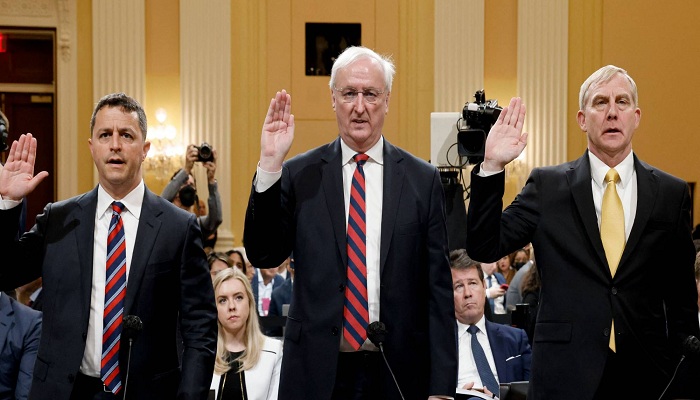Disinfectant producer issued a strong warning not to use its products on the human body after Trump suggested they could potentially used to treat covid-19.
Reckitt Benckiser, which owns Lysol and Dettol, said “under no circumstance” should its products be injected or ingested.
President Trump faces a backlash over his comments at a briefing on Thursday.Disinfectants are hazardous substances and can be poisonous if ingested.Even external exposure can be dangerous to the skin, eyes and respiratory system.
Donald Trump‘s comments have been heavily criticised by doctors and have generated a huge online response.They have provoked hundreds of thousands of comments and caused well-known cleaning brands to trend on social media.
Reckitt Benckiser, which also owns the brands Vanish and Cillit Bang, said its products should not be administered “through injection, ingestion or any other route”.
“Our disinfectant and hygiene products should only be used as intended and in line with usage guidelines. Please read the label and safety information,” the company said in a statement.
Tension simmers between Trump and governors over coronavirus testing
During Thursday’s White House coronavirus task force briefing, an official presented the results of US government research that indicated coronavirus appeared to weaken faster when exposed to sunlight and heat.
The study also showed bleach could kill the virus in saliva or respiratory fluids within five minutes, and isopropyl alcohol could kill it even more quickly.
Donald Trump then hypothesised about the possibility of using a “tremendous ultraviolet” or “just very powerful light” on or even inside the body as a potential treatment.
“And then I see the disinfectant where it knocks it out in a minute. One minute,” he said. “And is there a way we can do something like that, by injection inside or almost a cleaning?
“Because you see it gets in the lungs and does a tremendous number on them, so it’d be interesting to check that,” he said.
In a statement, the White House press secretary said the president had “repeatedly” told Americans to consult doctors about coronavirus treatment.
“Leave it to the media to irresponsibly take President Trump out of context and run with negative headlines,” Kayleigh McEnany said.
Former personal counsel to trump will be released from prison
Many compared his idea to a dangerous viral trend in 2018 where people ate Tide laundry detergent pods.
Lysol, which is one of the America‘s best known cleaning brands, has been named in tweets at least 125,000 times since the White House news conference.
Owners Reckitt Benckiser said they issued their statement on Friday “due to recent speculation and social media activity”.
Doctors warned that the president’s suggestion could have fatal results.
“This notion of injecting or ingesting any type of cleansing product into the body is irresponsible and it’s dangerous,” Dr Vin Gupta, a pulmonologist and global health policy expert said. “It’s a common method that people utilise when they want to kill themselves.”
“Inhaling chlorine bleach would be absolutely the worst thing for the lungs,” pulmonologist John Balmes told Bloomberg News. “The airway and lungs are not made to be exposed to even an aerosol of disinfectant.
“Not even a low dilution of bleach or isopropyl alcohol is safe. It’s a totally ridiculous concept.”
This is not the first time that Mr Trump‘s medical advice has generated controversy and criticism.
He has previously hyped a malaria medication, hydroxychloroquin, despite a lack of clinical evidence it helps treat Covid-19 and some concerns it can even be detrimental.
Using a disinfectant can kill viruses on surfaces. It’s a very good idea to keep clean the things you touch, using products with anti-microbial properties for example, substances with a high alcohol content.
There is also some evidence that, in general, viruses on surfaces die more quickly when directly exposed to sunlight. But we don’t know how much or how long they have to be exposed for UV light to have an effect, so you’re far safer just washing your hands and surfaces and trying not to touch your face.
Crucially, this is only about infected objects and surfaces not about what happens once the virus is inside your body.
One of the main ways of catching the virus is by breathing in droplets expelled by an infected person, mainly by sneezing and coughing. The virus very quickly begins to multiply and spread, eventually reaching the lungs.
Not only does consuming or injecting disinfectant risk poisoning and death, it’s not even likely to be effective.
Equally, by the time the virus has taken hold inside your body, no amount of UV light on your skin is going to make a difference.
Trump defended his actions in the early days of the coronavirus
And since UV radiation damages the skin, using it to kill the virus could be a case of to borrow a well-worn phrase the cure being worse than the disease.
Earlier this week, the US Centers for Disease Control and Prevention warned Americans to be careful with cleaning products as sales of household disinfectants soar amid the pandemic.
“Calls to poison centres increased sharply at the beginning of March 2020 for exposures to both cleaners and disinfectants,” the agency’s weekly morbidity and mortality report found.
The US Food and Drug Administration has also warned against ingesting disinfectants, citing the sale of bogus miracle cures that contain bleach and purport to treat everything from autism to Aids and hepatitis.
Last week, a federal judge secured a temporary injunction against one organisation, known as the Genesis II Church of Health and Healing, for marketing one of these products as a potential coronavirus cure.



